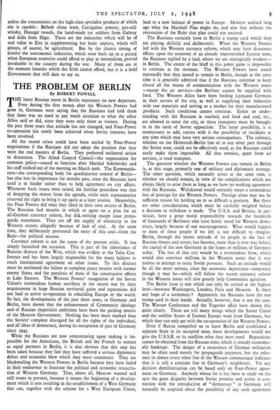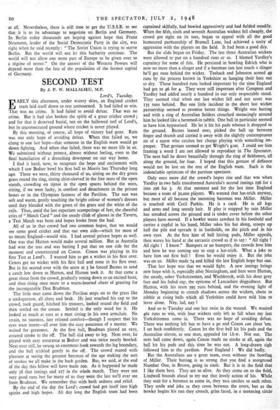THE PROBLEM OF BERLIN
By ROBERT POWELL
THE latest Russian move in Berlin represents no new departure. Even during the first month after the Western Powers had gone in, Germans were saying that the Russians had told them that there was no need to pay much attention to what the other Allies said or did, since they were only there as visitors. During the past three years that attitude has not changed, and Four-Power co-operation has rarely been achieved when Soviet interests have been involved.
All the recent crises could have been settled by Four-Power negotiations if the Russians did not adopt the position that they were the real masters of Berlin. They preferred unilateral action to discussion. The Allied Control Council—the organisation for common policy—ceased to function after Marshal Sokolovsky and his staff stalked out of the meeting on March loth. The Kommanda- tura—the corresponding body for quadripartite control of Berlin— has also lost its importance for months past, since the Russians have used it to hinder rather than to help agreement on city affairs. Whenever basic issues were raised, the familiar procedure was that of dropping the matter from the agenda, while each representative reserved the right to bring it up again at a later session. Meanwhile, the Four Powers did what they liked in their own sectors of Berlin. The Russians had months in which to agree on a plan for an all-German currency reform, but did. nothing except issue propa- ganda statements. They cut off the supply of electricity to the Western sectors allegedly because of lack of coal. At the same time, they deliberately prevented the entry of this coal—from the Ruhr=for political reasons.
Currency reform is not the cause of the present crisis. It has simply furnished the occasion. This is part of the inheritance of Russian distrust of the West, which was evident at the Yalta Con ference and has been largely responsible for the many failures to reach international agreement on other issues. To this distrust must be attributed the failure to complete peace treaties with former enemy States and the paralysis of most of the constructive efforts at Lake Success. The Western Powers' recognition of the Soviet Union's tremendous human sacrifices in the recent war by their acquiescence in huge Russian territorial gains and reparations did not lead to active co-operation in rebuilding Europe or the world. In fact, the developments of the past three years, in Germany and Berlin, have shown that the enhancement of Communist ideology and of Russian imperialist ambitions have been the guiding motive of the Moscow Government. Nothing has been more marked than the Soviets' complete disregard for all the rights of the individual, and all ideas of democracy, during its occupation of part of Germany since 1945.
While the Russians are now concentrating upon making it im- possible for the Americans, the British and the French to remain as equal partners in Berlin, it is also obvious that this step has been taken because they feel they have suffered a serious diplomatic defeat and economic blow which they must counteract. They are blackmailing the Western Powers in Berlin because they have failed in their endeavour to frustrate the political and economic resuscita- tion of Western Germany. That, above all, Moscow wanted and still wants to prevent, because it means the beginning of a develop- ment which it sees resulting in the establishment of a West Germany that can, together with the scheme for a West European Union, lead to a new balance of power in Europe. Molotov realised long' ago what the Marshall Plan might do, and also that without the restoration of the Ruhr that plan could not succeed.
The Russians certainly have in Berlin a trump card which they are playing skilfully and deliberately. When the Western Powers led with the Western currency reform, which may have disastrous effects upon the economy of an already impoverished Eastern zone, the Russians replied by a lead, where we are strategically weakest— in Berlin. The extent of the bluff in this poker game is impossible to estimate at the moment. The Western Powers have stated repeatedly that they intend to remain in Berlin, though at the same time it is generally admitted that if the Russians continue to keep closed all the means of communication with the Western zones —except the air services—the Berliner cannot be supplied with food. The Western Allies have been feeding 2,500,000 Germans in their sectors of the city, as well as supplying their industries with raw materials and serving as a market for their manufactured products. Such conditions cannot continue. Either an under- standing with the Russians is reached, and food and coal, etc., are allowed to enter the city, or these transports must be brought in in the teeth of Soviet opposition. The latter possibility, it is unnecessary to add, carries with it the possibility of incidents at any time which may have very serious consequences. The railways, whether on the Helmstedt-Berlin line or. in any other part through the Soviet zone, could not be effectively used, as the Russians could easily make them impossible. All that remains, apart from air services, is road transport.
The question whether the Western Powers can remain in Berlin is, at this stage, primarily one of military and diplomatic strategy. The other question, which naturally arises at the same time, is whether we should remain, in view of the complications which are always likely to arise there as long as we have no working agreement with the Russians. Withdrawal would certainly mean a tremendous loss of prestige for the Western Powers. Prestige alone may not be sufficient reason for holding on to so difficult a position. But there are other considerations which must be carefully weighed before a decision to withdraw is made. The U.S.A. and Britain, in par- ticular, have a great moral responsibility towards the hundreds of thousands of Berliners who have firmly stood for Western demo- cracy, largely because of our encouragement. What would happen to most of these people if we left is not difficult to imagine. Berlin, through the heroic attitude of its people in the face of Russian threats and terror, has become, more than it ever was before, the capital of the new Germany in the hopes of millions of Germans today. The loss of that city would be a tremendous blow, which would also convince millions in the Western zones that it was useless to attempt to resist Soviet pressure. Such an attitude would be all the more serious, since the economic depression—temporary though it may be—which will follow the recent currency reform in the Western zones will also greatly help Communist agitation.
The Berlin issue is one which can only be settled at the highest level—between Washington, London, Paris and Moscow. Is there any hope of a settlement ? Apparently the Russians have the one trump card in their hands. Actually, however, that is not the case. The Warsaw Conference and the Yugoslav affair have shown this quite clearly. There are still many things which the Soviet Union and the satellite States of Eastern Europe want from Germany, but which they can only get with the co-operation of the Western Powers.
Even if Russia compelled us to leave Berlin and established a separate State in its occupied zone, these developments would not give the U.S.S.R. or its satellites what they most need. Reparations cannot be obtained from the Russian zone, which is already economic- ally bankrupt. The danger of a recurrence of German militarism may be often used merely for propaganda purposes, but the refer- ence in almost every other line of the Warsaw communiqué indicates that it is still a constant fear to Germany's neighbours. Yet any decisive demilitarisation can be based only on Four-Power agree- ment on Germany. Anybody whose lot it has been to study on the spot the great disparity between Soviet promise and action in con- nection with the introduction of " democracy " in Germany will naturally be sceptical about the possibility of any such agreement at all. Nevertheless, there is still time to get the U.S.S.R. to see that it is to its advantage to negotiate on Berlin and Germany. In Berlin today thousands are hoping against hope that Franz Neumann, leader of the Social Democratic Party in the city, was right when he said recently : " The Soviet Union is trying to starve Berlin. But the world will not let this barbarity continue. The world will not allow one more part of Europe to be given over to a regime of terror." On the answer of the Western Powers will depend more than the fate of the population of the former capital of Germany.







































 Previous page
Previous page